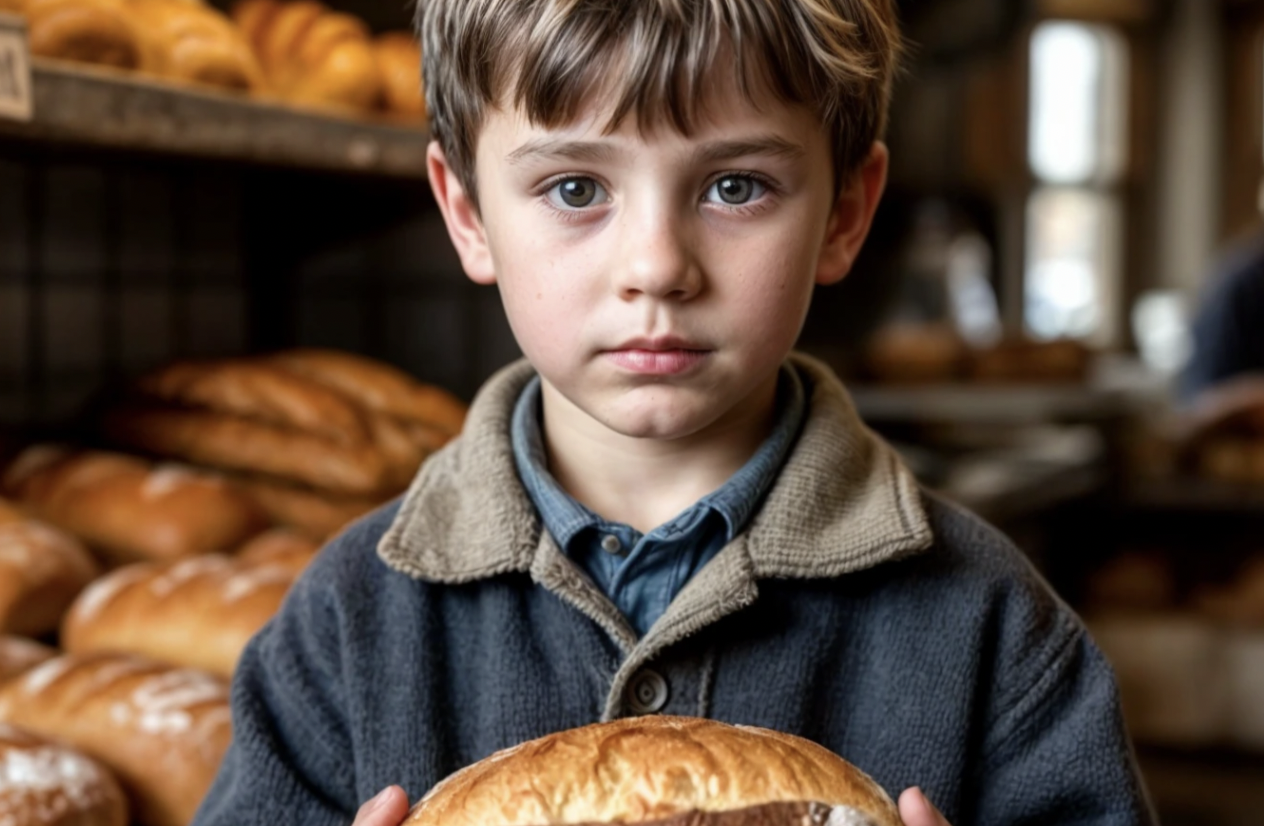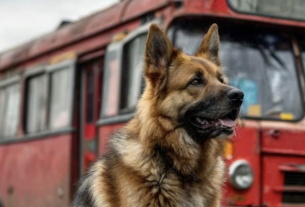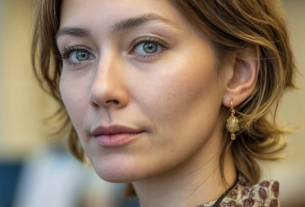The small shop was located at the corner, between the garages and the bus stop. In the morning, elderly women came for bottled milk, in the afternoon, schoolchildren for chewing gum, and in the evenings, workers for bread and sausage.
Marina Vasilyevna, the saleswoman with a black fringe, knew all the customers well. She also noticed that for the past two weeks, someone had been quietly taking buns. The count didn’t add up: every day, one or two were missing. There were no surveillance cameras, and there were always many customers, so it was difficult to keep track.
One day, closer to closing time, a boy about thirteen years old approached the counter: thin, in an oversized jacket, with wary gray eyes.
— Hello.
— What do you need, son?
— A loaf… — he quietly said, pouring a handful of change onto the counter.
Marina Vasilyevna counted the money and sighed: she was short by a whole ruble.
— It’s not enough.
— I’ll pay tomorrow…
Just as she was about to reply, the impatient murmurs of customers were heard from behind:
— Hurry up, boy!
The boy clenched the coins in his fist, mumbled, “Sorry,” and ran out the door. The saleswoman watched him: his step was short, as if unsure whether he should continue.
The next morning, the storekeeper brought a report to the police: two loaves had disappeared again from the “loss” box. Major Artyom Vodovozov, a sportsman-like man, didn’t appear often, but today he came in “for the report.”
— Do you have suspects? — asked the major, surveying the room.
— Plenty, — Marina Vasilyevna shrugged. — But I think it’s the boy from yesterday.
— Can you identify him?
— It’s not about that. He’s too thin, too hungry.
— That’s speculation, — the major cut in. — If we catch him, we’ll file the report.
In the evening, Marina Vasilyevna noticed a familiar cap at the far end of the hall. The boy stood by the bread shelf, twisting a loaf in his hands, looking around. The saleswoman watched him closely.
— Should we grab him? — whispered the guard Slavka.
— Let’s wait, — she replied.
The boy shoved the loaf under his jacket, pretended to look for money, and headed for the exit.
Slavka blocked his way:
— Stop. Show what’s under your jacket.
The boy shuddered and mumbled:
— I need to go home…
— You stole the loaf, — said Marina Vasilyevna quietly.
— I’ll return it! I’ll bring it tomorrow!
— Tomorrow will be too late.
At that moment, Major Vodovozov walked in, raising an eyebrow:
— Caught him?
— Caught him, — sighed the saleswoman.
The boy was led to the storeroom and sat on a stool. The major turned on the recorder:
— Last name, first name?
— Makarov Denis.
— Address?
— …Garazhnaia, 27.
Marina Vasilyevna handed the major the loaf as evidence. He followed the protocol: a minor offense, but an offense nonetheless.
Denis sat with his head lowered. His eyes showed shame and tension.
Suddenly, Marina Vasilyevna said:
— Comrade Major, can I take him home myself? I want to see how he lives.
— According to protocol, he should go to the station first, then social services.
— But in all fairness, we should first understand what’s going on.
The major thoughtfully folded his hands behind his back. He was a man, not a machine:
— Fine. I’ll hold off the report until tomorrow. If the reasons are valid… we’ll see.
The Garazhnaia street resembled a collection of crooked garages and several old one-story shacks. Marina Vasilyevna followed Denis, who cautiously held the loaf with both hands, as if it were something precious.
— Is this where you live?
— Yes.
A house made of white silicate bricks, with windows covered by cardboard instead of glass. Denis kicked the door, and it creaked open.
— Granny, I’m home!
There was no answer. Inside, there was a smell of dampness and medicine. In the corner stood a metal bed with a woman lying on it in an old padded jacket over her robe. Her face was pale, her hair gray.
— Granny… this is Aunt Marina…
Marina Vasilyevna stepped forward:
— Hello. I’m from the shop.
The woman struggled to turn her head:
— Denis, did you bring the medicine?
— Not yet, Granny. But here’s the loaf.
She closed her eyes, her lips trembled slightly. Marina Vasilyevna looked around the room: an empty pot, a bit of porridge at the bottom of a bowl, and only medicine bottles in the fridge.
— How do you live here?
Denis stood up straight, as if preparing to defend himself:
— On Granny’s pension. But the bank card is blocked: we need to change banks, and it’s hard for her to walk.
— What about your parents?
— Mom… somewhere in the city. She doesn’t call. I don’t know my dad.
A wave of anger rose within Marina Vasilyevna: at the banking problems, the empty house, the indifference of others.
— How long have you gone without eating?
— Two days. Granny gave me her last, but I ate it all yesterday.
She sat next to him, placing her hand on his shoulder:
— Why didn’t you ask for help?
— I was ashamed.
Marina Vasilyevna sighed deeply:
— You’re foolish. You should have told the truth, not stolen.
Denis shook his head:
— You would have kicked me out.
She smiled bitterly through her tears:
— Would I have kicked you out instead of giving you some bread? Don’t expect that.
An hour later, the apartment smelled of pasta and stew: Marina Vasilyevna had gone to the store, gathered a food parcel, gave money to the neighbors, and asked them to call the paramedic.
The paramedic Vasilych arrived in an old Niva:
— She had a stroke, now she’s bedridden. She can’t be without medication.
— Write the prescription, — the saleswoman nodded. — I’ll pay.
— Will your store take back the report? — suddenly the boy blurted out.
— I’ll take it back, — she promised. — But you also promise: no more stealing.
Denis nodded quickly, like a puppy being called in from the cold.
The next morning, Marina Vasilyevna entered the storeroom where the major was waiting.
— Did you bring the documents?
— There won’t be a report, — she said firmly. — This boy is not a thief. He was saving his grandmother.
And she told everything. The major listened quietly, then said:
— Will social services help with the benefits?
— We’ll file the application. Social security will restore the pension card. I’m helping.
— Then my report stays with me, — he smiled. — Let the boy grow up. Just— no more loaves under the jacket.
A week later, a notice appeared in the store “Products No. 17”: “If you need help, ask the saleswoman. There will be bread for everyone.” Next to it was a box labeled “For Denis and his grandmother,” where people began to drop packs of buckwheat, small change, and chocolates.
Denis started coming every evening, helping to unload goods and mop the floors. For this, he received a loaf of bread and a new sweater from his neighbor Lydia. The red stray dog from the neighboring house became his faithful shadow.
One day, Major Vodovozov met Denis at the bus stop:
— How’s it going, my conscience? — he said, handing the boy a ticket to the circus. — You going?
— I can’t with Granny, — Denis blushed.
— I’ve got two tickets. Pick someone to go with.
Denis smiled so brightly that the major thought, “We made the right decision letting him go.”
By spring, Granny Lida could sit in a chair and even knit napkins. Denis brought milk from the store and read the newspapers aloud. Marina Vasilyevna came with pies. Her colleague once remarked:
— Marina, are you going to save all the orphans?
She laughed:
— If not us, then who?
At the end of April, a letter from the city education department arrived at School No. 12: “Award sixth-grader Denis Makarov with a certificate for courage and diligence.” The principal thought long about what exactly to award the boy for. Then he realized: sometimes courage means asking for help at the right time and not being afraid to tell the truth.
At the ceremony, Denis stood in a new jacket, with his grandmother holding a cane beside him, and Marina Vasilyevna with a bouquet of flowers.
After the award, his classmates surrounded him:
— Did you really steal?
— No, — Denis smiled. — I was just carrying bread home.
— And now?
— Now I buy it. Because they trust me.
At the school entrance, Major Vodovozov waited in uniform.
— Well, loaf knight? — he winked. — Progress is evident.
— Thank you, — Denis said quietly. — You could have…
— We made the right choice, — the major interrupted. — Don’t let us down.
He extended his hand. Denis shook it firmly — now his hand no longer trembled.
That evening, on a bench near the store “Products No. 17,” two people sat: the saleswoman with a cup of hot tea, and the boy with a piece of bread. The warm wind blew dust along the road. The red stray dog slept at their feet.
Marina Vasilyevna looked at Denis:
— You know, no one says you’re a thief anymore.
He smiled like an adult:
— Let them know: bread is not just a product.
She raised her cup:
— Let’s drink to that.
He took a bite of the bread and broke off a piece for the dog. Ordinary bread, an ordinary yard. Only somewhere nearby, the old certainty that a hungry boy would inevitably steal was beginning to crumble. Now they knew: sometimes he’s just saving a life — his own and those he loves.


